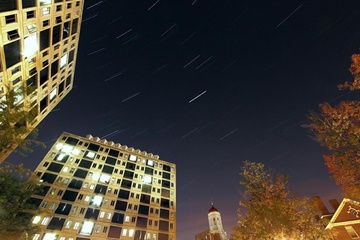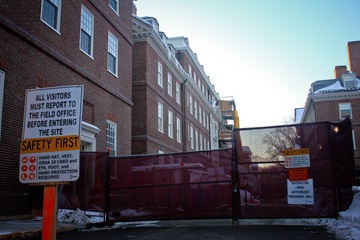"I’m not gonna say anything bad. This is Leverett, the best house."
I disagree, but bite my tongue. My belltower—my home for the past two years here—is obscured by the mangled edges of New Quincy and Old Lev.
It’s Friday night and I’m nestled on the floor of the Leverett Building Manager’s office. It’s a cubbyhole of about 50 square feet, but the shelving along the sides, along with a desk and chair, makes it feel more cramped. I tell him I’m writing a story about members of the community who aren’t students. People who work here.
Robert Gibson, Sr., a white-haired man who could be a double for Joe Biden, maybe, if he weren’t a decade or two his senior, sits at his desk in the familiar Securitas uniform. He’s the keeper of leftover packages—one that’s waiting for a graduate who can’t get a visa back into the country, a "perishable" stamp, and USPS tape.
Gibson grew up in Somerville, and still lives there. I smile—I can tell, it’s in the accent. Later, he tells me he was born as the stock market burned in 1929, lived through Pearl Harbor, and witnessed the changing attitudes towards Asian Americans. (They’re the nicest people, he tells me, though for a time in his life they were feared.) Despite living through several financial crises and the better part of a century, Gibson has no plans to stop working. If he does, it’ll only be to care for his ailing daughter, Kathleen. "Working keeps you young, walking keeps you young," he says.
Gibson is a Bruins fan. That’s actually how he got into guarding—back when he was working with audio equipment, he made a contact at Security Systems at the Boston Garden before it was torn down. Still, he started freelancing in security, every now and then. Over 14 or so years, he guarded each of the houses, except Pforzheimer and Kirkland.
For the past 11 years, though, he’s been here, at Leverett.
The radio in his security belt is cackling. Something about a student in Currier. Gibson reaches to turn it down, leaning in to hear me better. I ask louder, what his job consists of, day-to-day.
"I sit here and talk to pretty ladies like you," he says.
Actually, Gibson is a caretaker—a kind of guardian angel between the hours of four and twelve, making rounds like clockwork, and helping the lost and confused, those locked out and those in need of toilet paper. He tells students, "Come right here and we’ll take care of you."
Gibson has a grandfatherly charm, which may be fitting. If the House Masters are parents, he’s gramps.
"Anne [the wife of Leverett House Master Howard M. Georgi ’68] is the most pleasant person in the world," he says. "They call him Chief and her, Coach." Why, he doesn’t know. "I don’t think I’ve ever seen a student leave here or graduate who didn’t like them."
He likes them, too, as well as the Building Manager, Paul Hegarty, whom Gibson describes as very level-headed, a characteristic he wishes he possessed. And the students, and the tutors? He likes them, too. He became friendly with some of the latter—a few that had been at Leverett for the better part of a decade—although he never saw them outside the house. The students, though, he chats with, but they never becomes close. Why, he doesn’t know.
Sometimes, Gibson has a little fun with students. He’ll say, "What do you mean you’ve been locked out? Now you’ve gotta stay out all night, what if it rains?"
But really, the office is never closed more than 15 minutes. During that time, Gibson crosses the street, walks through the old Leverett basements and courtyards. He makes sure the locks are working properly, circles the building on the outside. If there are broken streetlights, he makes a note. "And if anyone needs anything along the way," he says, "you stop and take care of them."
These past few evenings, there haven’t been many lockouts. But the first couple of days back, Gibson was constantly on his feet. The sophomores, he says, often forget that they no longer have to call HUPD, that he wants to be there to help.
"I love working here. I never thought I’d be a security guard, I thought it was the lowest part of life," he says. But now, caring for our community is a point of pride. Many of the guards, he says—some of whom got their start with Security Systems just like he did—are impressive co-workers. One of them used to be a police chief. "You’ve got intelligent people now, people who care," he says. "That’s what Harvard wanted."
As we’re talking, a student pops in, her thick eyeliner smeared from, no doubt, Friday night. She’s looking for a package. Gibson tells her it’s still at the depot, but she takes some toilet paper anyway. He smiles, glancing at the boxes that still haven’t been claimed.




